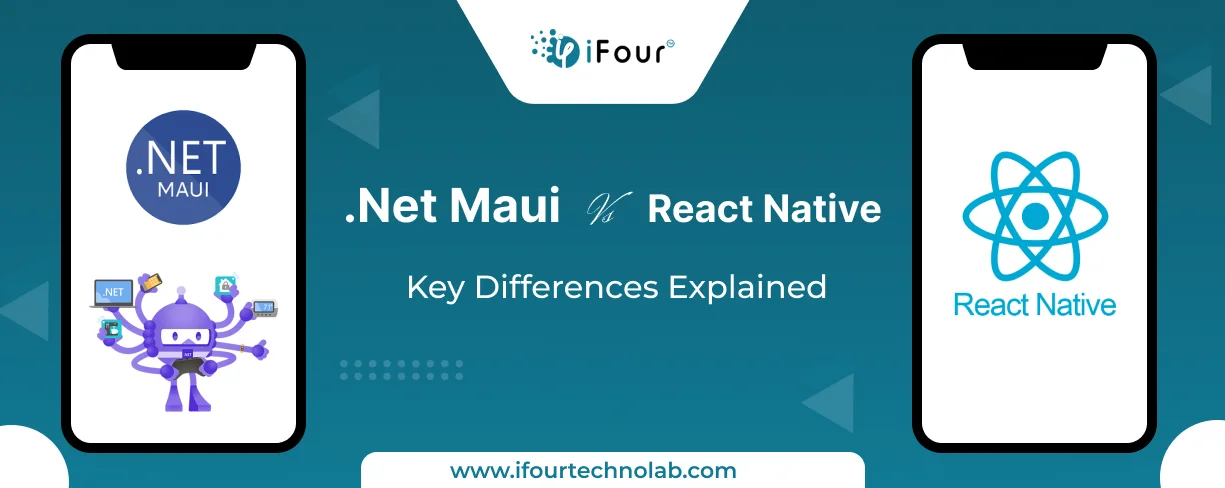ETL vs ELT: Key Differences, Benefits & Use Cases Explained
It's amazing to see how Data teams today are racing ahead - moving from traditional warehouses to cloud-native platforms, lakehouses, and real-time architectures. But in this rush,...
Listening is fun too.
Straighten your back and cherish with coffee - PLAY !

The dominance of Android, which holds a 71% market share, coupled with iOS supremacy in the US market, shows just how important it is to create apps that work on different platforms. Their amazing abilities allow users - access everything right under their fingertips is the reason why 80% of people around the world love these platforms, and business leaders are paying attention to them.
Since there are lots of technologies available, which framework is the best for cross-platform applications is a big question!
.NET MAUI and React Native have been the top favourites for this and are gaining ground because of their native-like experiences. In this blog, we’ll dive into the important differences between .NET MAUI and React Native to figure out which one is the best fit for your mobile app project.
.NET MAUI is a framework designed to help developers in building cross-platform applications using C# and XAML. It supports the development of native apps for Android, iOS, macOS, and Windows from a single code base making full use of the .NET ecosystem.
In contrast, React Native developed by Facebook is a JavaScript framework used for creating mobile apps. It allows developers to write code in JavaScript and use native components with support for both iOS and Android. What’s so interesting about React Native is its focus on employing reusable components and supports a vast array of third-party libraries.
| Feature | .NET MAUI | React Native |
|---|---|---|
| Programming Language | Uses C# for cross-platform app development. | It uses JavaScript for multi-platform application development. |
| Platform Support | iOS, Android, macOS, Windows | iOS, Android, Web |
| UI Development | XAML-based declarative UI | JavaScript-based declarative UI |
| Performance | Generally better performance due to native compilation | Can have performance bottlenecks due to the JavaScript bridge |
| Ecosystem | Strong integration with the .NET ecosystem | Large JavaScript ecosystem with many third-party libraries |
| Learning Curve | Easier for developers familiar with .NET | Easier for developers familiar with JavaScript and React |
| Hot Reload | Supports hot reload for faster developmentk | Even this supports hot reload for faster development |
| Cross-Platform Consistency | Aims for consistent UI across platforms | May require platform-specific customizations |
| Community and Support | Growing community, strong Microsoft support | Large community, extensive third-party ecosystem |
| Cost | Free and open-source | Free and open-source |
Choosing the right framework for app development is critical as it affects your app's efficiency, scalability, and overall success. It influences how quickly you can launch, adapt to changes, and deliver a smooth user experience.
Now let’s look at the key factors to identify the most flexible, and cost-effective option that aligns with your business goals.
Now that understand what is the difference between .NET MAUI and React Native, let’s delve towards the factors to consider for decision-making.
.NET MAUI uses C# and XAML for building cross-platform apps and offers deep integration with the .NET ecosystem which makes it ideal for teams familiar with these technologies.
React Native focuses on JavaScript and a large ecosystem of reusable components by strong choice for projects requiring fast development and a broad range of third-party libraries. The ideal choice depends on the team's expertise, project scope, and long-term goals for .NET MAUI vs React Native performance.
React Native is very popular right now because of its strong community and many libraries.
.NET MAUI is growing in popularity, especially among developers who use C# and .NET, but it's not as widely used as React Native yet.
React Native is an established platform, however, .NET MAUI is getting better and closing the gap. Here is the lively debate on what advantages does .NET offers over React Native. Now talking about the companies that use these platforms.
To put it simply, Both frameworks have proven effective for different types of successful projects.
.NET MAUI offers a faster time to market if the team is already skilled in C# and .NET, as its seamless integration with existing tools and libraries. However, for teams new to C# there may be a learning curve that could delay initial development. Additionally, as a relatively new framework, MAUI may have fewer third-party resources and community support which might impact development speed.
React Native on the other hand tends to provide a quicker time-to-market due to its reloading feature which allows developers to see changes instantly and rapidly. With its use of JavaScript or TypeScript a language familiar to many developers and a rich ecosystem of libraries and community support. React Native can streamline development and accelerate project delivery.
.NET MAUI:
React Native:
.NET MAUI integrates easily with the .NET ecosystem, making it easy for businesses already using Microsoft technologies. It connects well with .NET libraries, Azure services, and other Microsoft enterprise solutions. React Native offers flexible integration with various backend services and APIs, supporting diverse business processes. It can connect with different tools and services through third-party libraries though some integration might require custom solutions.
.NET MAUI:
Initial Development Costs:
.NET MAUI have lower initial costs for teams already proficient in C# and .NET, as they can leverage existing knowledge and tools. However, if team is new to the .NET ecosystem training or hiring C# developers may increase upfront costs.
Maintenance and Support Expenses:
Maintenance costs is lower if the business already relies on .NET infrastructure as it can be maintained by existing IT team. The framework's alignment with Microsoft’s ecosystem ensures long term support which can reduce unforeseen expenses.
Long-Term Cost-Effectiveness:
MAUI's strong integration with Microsoft tools can lead to long term savings in enterprise environments.
Resource Costs:
Hiring skilled .NET MAUI developers might be more challenging and expensive due to the framework’s newer nature and the specialized skill set required.
Initial Development Costs:
React Native often has lower initial development costs, especially for startups or businesses with existing JavaScript expertise.
Maintenance and Support Expenses:
React Native’s large community and extensive library support can keep maintenance costs lower. However, dealing with platform specific issues or frequent updates from Facebook may have some additional costs.
Long-Term Cost-Effectiveness:
React Native's cross platform capabilities make it cost effective in the long run.
Resource Costs:
JavaScript and React developers are widely available which generally lowers hiring costs. The vast community and resource availability also make it easier to find affordable support and development resources.
.NET MAUI vs React Native pros and cons in terms of performance and user experience. .NET MAUI tends to offer better performance and responsiveness in apps due to its close integration with the platform and the .NET runtime, leading to more native like experiences. It ensures consistency of user experience across platforms, especially within the Microsoft ecosystem. Businesses that have implemented MAUI often appreciate its performance.
React Native also delivers strong performance, though it may require optimization for complex apps as itt excels in providing a consistent user experience across platforms through shared code, some businesses also report occasional challenges with maintaining smooth performance across both iOS and Android. Feedback generally highlights its ease of use, especially for teams familiar with JavaScript, and its ability to quickly bring apps to market.
.NET MAUI scales well within the Microsoft ecosystem, offering flexibility in adding features and existing .NET tools, though its new system may limit some third-party integrations. It’s future-proofed by Microsoft’s backing, especially for businesses using Microsoft technologies. React Native is highly flexible and scalable, allowing easy integration of new features with third-party services. Its mature ecosystem and active community make it a reliable, future-proof choice for businesses looking to grow.
React Native is highly flexible and scalable, allowing easy integration of new features with third-party services. Its mature ecosystem and active community make it a reliable, future-proof choice for businesses looking to grow.
.NET MAUI offers robust, built-in security features and strong compliance with industry regulations for regulated industries like finance and healthcare. Microsoft’s regular updates and security infrastructure ensure problems are addressed quickly.
React Native provides flexibility but it requires developers to actively manage security and compliance. While it can meet industry standards it depends on the development team to implement and maintain secure practices, especially for sensitive data.
To conclude, choosing between MAUI vs React Native for app development depends on aligning the framework with the business goals and strategy.
One should consider the abovementioned key considerations before going with React Native or .NET MAUI.
For large enterprises, .NET MAUI is often recommended. For startups, mid-sized businesses or those prioritizing speed and cross-platform consistency, React Native is usually the better choice.
For large enterprises, .NET MAUI is often recommended. For startups, mid-sized businesses or those prioritizing speed and cross-platform consistency, React Native is usually the better choice.
DOT NET MAUI is the way to go, especially for industries like fintech and healthcare. It offers strong performance and native-like experience making it suitable for enterprise-level applications.
React Native is for businesses seeking faster time-to-market, flexibility, and scalability, particularly in industries like e-commerce or startups. Its wide adoption, large community, and ease of use with JavaScript make it a good fit for smaller businesses or those looking to quickly expand across platforms.
Things are completely different when it comes to small businesses or Startups be it Healthcare, Legal, or Fintech.
To decide on .NET MAUI vs React Native for small business app development, you need to consider certain factors.
React Native is the best choice for mobile app development, especially for startups. Its flexibility, faster time-to-market, and large developer community make it ideal for small businesses looking to quickly launch cross-platform apps.
React Native’s use of JavaScript, a widely known language also makes it easier to find developers and scale your app as the business grows.
So that’s it from this blog, I hope this helps you clarify several facts about DOT NET MAUI vs React native. Get cross-platform applications developed by iFour, a leading .NET MAUI app development company, and benefit from their expertise.
If the business is already invested in the Microsoft ecosystem then one can choose .Net MAUI over react native, as it offers seamless integration with Microsoft tools, strong performance, and robust security features. It is ideal for apps requiring a native experience and long-term support backed by Microsoft.
One can choose React Native over .NET MAUI if they need faster time-to-market, flexibility, and a large developer community. It is ideal for cross-platform development, especially for startups or businesses looking to quickly launch apps with a consistent user experience across both iOS and Android.
Choose .NET MAUI for mobile app development if one needs seamless integration with Microsoft tools, strong native performance, and robust security features.
One can choose React Native for mobile app development to quickly build cross-platform apps. It is easy to use, widely supported and allows you to develop for both iOS and Android simultaneously, saving time and resources.

It's amazing to see how Data teams today are racing ahead - moving from traditional warehouses to cloud-native platforms, lakehouses, and real-time architectures. But in this rush,...

Think about the last time CTOs spent most of their time fixing old systems. Updates were slow, servers were expensive, and adding new features took time. Now, things have changed....

Remember our last Power BI forecasting guide? It uncovered what really blocks accuracy. Now it's time to take the next step. Knowing Power BI challenges is just the start - mastering...